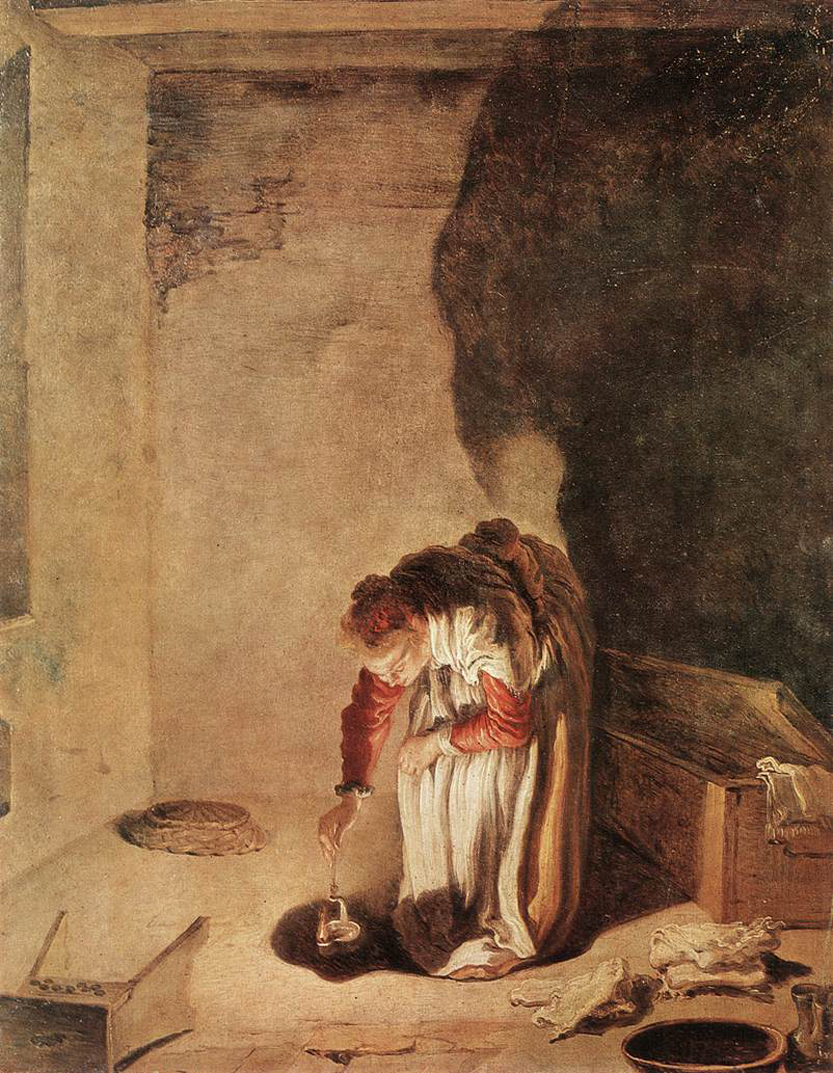
The Good Shepherd
James Tissot, ca. 1890

The Lost Coin
Domenico Fetti, ca. 1620
Who is overwhelmed by negative energy
and intense suffering
I will hold such a rare one dear
As if I had found a precious treasure.
- Langri Tangpa, Eight Verses for Training the Mind (4)
My dear friends,
The parables of the lost sheep and the lost coin symbolize the boundless compassion of an awakened mind (Bodhicitta). Just as the shepherd rejoices upon finding the lost sheep, and the woman celebrates the recovery of her coin, so too does a Bodhisattva cherish those whom the world deems lost.
were coming near to listen to him.
And the Pharisees and the scribes
were grumbling and saying,
"This fellow welcomes sinners
and eats with them."
- Luke 15:1-2
The Pharisees and scribes grumbled that Jesus welcomed sinners, yet their complaint reveals their own blindness. Those who stray into delusion, who are tormented by afflictions, are not to be despised but embraced with an open heart. A Bodhisattva sees suffering beings not as burdens, but as the very field in which compassion is cultivated. To scorn them is to reject the opportunity to embody wisdom and love.
having a hundred sheep and losing one of them,
does not leave the ninety-nine in the wilderness
and go after the one that is lost until he finds it?
And when he has found it,
he lays it on his shoulders and rejoices.
And when he comes home,
he calls together his friends and neighbors,
saying to them,
'Rejoice with me, for I have found my lost sheep.'
Just so, I tell you, there will be more joy in heaven
over one sinner who repents
than over ninety-nine righteous persons
who need no repentance."
- Luke 15:3-7
Like the shepherd who leaves the ninety-nine to seek the lost one, a Bodhisattva does not remain with those who are already secure in virtue but actively seeks out those drowning in affliction. This is not foolishness, but the highest wisdom. The lost sheep represents the being who has strayed into delusion, but rather than casting it aside, the shepherd lifts it upon his shoulders, carrying it back with joy. In the same way, those who are lost in suffering are carried in the heart of Bodhicitta, the Awakening Mind.
does not light a lamp, sweep the house, and search carefully until she finds it?
And when she has found it, she calls together her friends and neighbors,
saying, 'Rejoice with me, for I have found the coin that I had lost.'
Just so, I tell you, there is joy in the presence of the angels of God over one sinner who repents."
- Luke 15:8-10
The woman who searches for the lost coin embodies the diligence of a Bodhisattva. She does not simply mourn her loss; she takes action, lighting a lamp and sweeping the house. Likewise, the practitioner of compassion does not despair when encountering suffering, but illuminates it with wisdom and actively seeks to alleviate it. Her joy upon finding the coin mirrors the joy of the awakened heart when even one being is freed from suffering.
The heart of a Bodhisattva does not discriminate between those who are virtuous and those who have strayed, for all beings possess the same luminous essence. Like the shepherd and the woman, the Bodhisattva understands that no one is beyond redemption. Those who are lost are not to be abandoned, but sought with joyful perseverance, for in their return lies the fulfillment of the path.
The joy in these parables is an expression of mudita, the third of the Four Immeasurables. It is not a self-centered happiness but an overflowing joy for the liberation of others. The shepherd does not lament the lost time, nor does the woman dwell in distress over her earlier loss—rather, they rejoice in the restoration of wholeness. This is the joy of a Bodhisattva, who delights in the well-being and awakening of others, finding fulfillment in their freedom from suffering.
For one on the Bodhisattva path, mudita is essential, for without it, compassion may become burdened with sorrow, and effort may feel weighed down by struggle. True empathetic joy lightens the path, making it effortless and radiant. To rejoice in another’s liberation is to affirm the interconnectedness of all beings, dissolving the illusion of separation. In this, the parables remind us that a Bodhisattva does not merely seek to save others but to rejoice in their return, embracing their awakening as if it were their own.
Thus, the lost sheep and the lost coin reveal the very heart of the Bodhisattva path. To cherish those who are lost, to seek them with unwavering compassion, and to rejoice in their return—this is the way of the Awakened Heart. In this, we train our minds to see suffering beings as treasures, and in doing so, we draw ever closer to the boundless love and joy of the Awakened Ones.